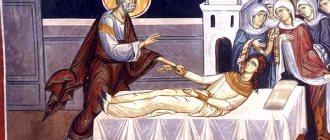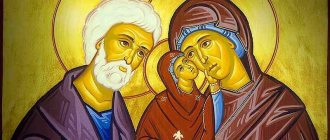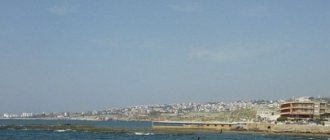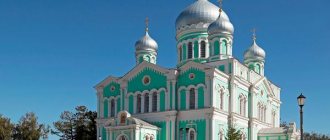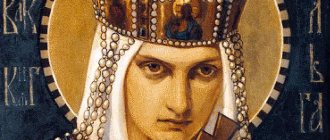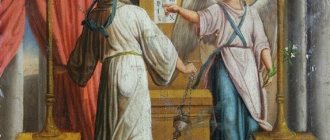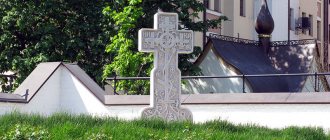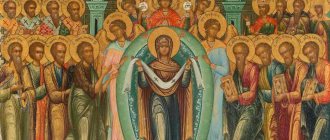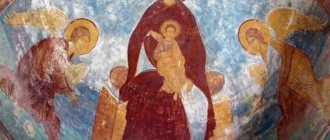Biography
Saint Anne, according to the Christian religion, is the mother of the Virgin Mary, the grandmother of Jesus Christ. She lived for many years in a childless marriage with Joachim, until a miracle happened - the birth of the Mother of God. In the Christian world, a woman is revered by believers and is considered the patroness of millers, weavers, bakers, and women in childbirth.
Joachim, Anna and Maria. Artist Taddeo Mazzi / Polomuseale
The exact date of birth in Anna's biography is unknown. According to the texts of Scripture, the saint was the daughter of the priest Matthan. On her father's side, the girl came from the tribe of Levi, on her mother's side, from the tribe of Judah. When she was young, she was given as a wife to Joachim.
RIGHTEOUS ANNA, MOTHER OF THE HOLY VIRGIN
Saint's Memorial Day - August 7, 2022
The holy righteous Joachim came from the tribe of Judah, from the house of King David. His genealogy is as follows: David’s son Nathan gave birth to a son, Levi, Levi gave birth to Melchia and Panfir, Panfir gave birth to Varpafir, and Varpafir gave birth to Joachim, the father of the Mother of God.
Saint Joachim lived in the city of Nazareth of Galilee and had a wife named Anna from the tribe of Levi, from the family of Aaron, the daughter of the priest Matthan, who lived before the reign of Herod, the son of Antipater. This priest Matthan had as his wife Mary, from the tribe of Judah, from the city of Bethlehem, and three daughters: Mary, Sovia and Anna. Of these, Mary was the first to marry in Bethlehem and gave birth to Salome; then Sovia married, also in Bethlehem, and gave birth to Elizabeth, the mother of John the Baptist; the third, as we have already said, the mother of the Most Holy Theotokos, was given in marriage to Joachim in the country of Galilee, in the city of Nazareth. These spouses, Joachim and Anna, coming from a noble family, studied the law of the Lord and were righteous before God. Having material wealth, they were not deprived of spiritual wealth. Adorned with all virtues, they immaculately observed all the commandments of God's law. For each holiday, pious spouses separated two parts from their property - one was given for church needs, and the other was distributed to the poor.
With their righteous life, Joachim and Anna pleased God so much that He vouchsafed them to be the parents of the Blessed Virgin, the chosen Mother of the Lord. From this alone it is already clear that their life was holy, pleasing to God and pure, since they had a Daughter, the Holiest of all saints, who pleased God more than anyone else, and the Most Honest of the Cherubim. At that time there were no people on earth more pleasing to God than Joachim and Anna, because of their immaculate lives. Although at that time it was possible to find many living righteously and pleasing God, these two surpassed everyone in their virtues and appeared before God as the most worthy for the Mother of God to be born from them. Such mercy would not have been granted to them by God if they had not truly excelled everyone in righteousness and holiness. But just as the Lord Himself had to be incarnate from the Most Holy and Most Pure Mother, so it was fitting for the Mother of God to come from holy and pure parents. Just as earthly kings have their purples, made not from simple matter, but from gold-woven material, so the Heavenly King wanted to have His Most Pure Mother, in whose flesh, as in royal purple, He had to put on, born not from ordinary incontinent parents, as would be from simple matter, but from chaste and holy ones, as if from cloth woven with gold, the prototype of which was the Old Testament tabernacle, which God ordered Moses to make from scarlet and scarlet cloth and fine linen (Ex. 27:16). This tabernacle prefigured the Virgin Mary, in whom God dwelt “to have pasture with men,” as it is written: “Behold, the tabernacle of God is with men, and He will dwell with them” (Rev. 21:3). The scarlet and scarlet cloth and fine linen from which the tabernacle was made typified the parents of the Mother of God, who came and was born from chastity and abstinence, as if from scarlet and scarlet clothing, and their perfection in fulfilling all the commandments of the Lord, as if from fine linen.
But these holy spouses, by God’s will, were childless for a long time, so that in the very conception and birth of such a daughter the power of God’s grace, the honor of the Born One and the dignity of the parents would be revealed; for it is impossible for a barren and aged woman to give birth otherwise than by the power of God’s grace: it is no longer nature that acts here, but God, who defeats the laws of nature and destroys the bonds of infertility. To be born from barren and elderly parents is a great honor for the one born herself, because she is born not from incontinent parents, but from abstinent and elderly ones, such as Joachim and Anna, who lived in marriage for fifty years and had no children. Finally, through such a birth, the dignity of the parents themselves is revealed, since after a long period of infertility they gave birth to joy to the whole world, thereby becoming like the holy patriarch Abraham and his pious wife Sarah, who, according to the promise of God, gave birth to Isaac in his old age (Gen. 21:2). However, without a doubt, we can say that the Nativity of the Mother of God is higher than the birth of Isaac by Abraham and Sarah. Just as much as the born Virgin Mary herself is higher and more worthy of honor than Isaac, so much greater and higher is the dignity of Joachim and Anna than Abraham and Sarah. They did not immediately achieve this dignity, but only through diligent fasting and prayers, in spiritual grief and in heartfelt sorrow, they begged God for this: and their sorrow turned into joy, and their dishonor was a harbinger of great honor, and the diligent petition of the leader to receive benefits, and prayer is the best intercessor.
Joachim and Anna grieved and cried for a long time that they had no children. Once, on a great holiday, Joachim brought gifts to the Lord God in the Jerusalem Temple; together with Joachim, all the Israelites offered their gifts as sacrifices to God. Issachar, the high priest at that time, did not want to accept Joachim’s gifts because he was childless.
“We should not,” he said, “accept gifts from you, because you do not have children, and therefore no blessings from God: you probably have some secret sins.”
Also, one Jew from the tribe of Reuben, who brought his gifts along with others, reproached Joachim, saying:
“Why do you want to make sacrifices to God before me?” Do you not know that you are not worthy to bring gifts with us, for you will not leave descendants in Israel?
These reproaches greatly saddened Joachim, and in great sorrow he left the temple of God, disgraced and humiliated, and the holiday for him turned into sadness, and the festive joy was replaced by sorrow. Deeply grieving, he did not return home, but went into the desert to the shepherds who tended his flocks, and there he cried about his barrenness and about the reproaches and reproaches made to him. Remembering Abraham, his forefather, to whom God had given a son already in old age, Joachim began to earnestly pray to the Lord that He would grant him the same favor, would hear his prayer, have mercy and take away the reproach from people from him, granting him in his old age the fruit of his marriage, as Abraham once was.
“May I,” he prayed, “have the opportunity to be called the father of a child, and not endure reproaches from people childless and rejected from God!”
Joachim added fasting to this prayer and did not eat bread for forty days.
“I won’t eat,” he said, “and I won’t return to my house; Let my tears be my food, and let this desert be my home, until the Lord God of Israel hears and takes away my reproach.
In the same way, his wife, being at home and hearing that the high priest did not want to accept their gifts, reproaching her for barrenness, and that her husband had retired into the desert out of great sorrow, cried inconsolable tears.
“Now,” she said, “I am the most unfortunate of all: rejected by God, reproached by people and abandoned by my husband!” What to cry about now: about your widowhood, or about childlessness, about your orphanhood, or about the fact that you are not worthy to be called a mother?!
She cried so bitterly all those days.
Anna's slave, named Judith, tried to console her, but could not: for who can console one whose sadness is as deep as the sea?
One day, sad Anna went into her garden, sat down under a laurel tree, sighed from the depths of her heart and, raising her eyes, full of tears to the sky, saw a bird’s nest with little chicks on the tree. This sight caused her even greater grief, and she began to cry with tears:
- Woe to me, childless! I must be the most sinful among all the daughters of Israel, that I alone am so humiliated before all the wives. Everyone carries the fruit of their womb in their hands - everyone is comforted by their children: I alone am alien to this joy. Woe is me! The gifts of everyone are accepted in the temple of God, and they are shown respect for their childbearing: I alone am rejected from the temple of my Lord. Woe is me! Who will I be like? neither to the birds of the air, nor to the beasts of the earth: for they too bring You, O Lord God, their fruit, but I alone am barren. I cannot even compare myself with the earth: for it vegetates and grows seeds and, bearing fruit, blesses You, the Heavenly Father: I alone am barren on earth. Woe is me, Lord, Lord! I am alone, sinful, without offspring. You, Who once gave to Sarah in her old age the son Isaac (Gen. 21:1-8), You, Who opened the womb of Anna, the mother of Your prophet Samuel (1 Sam. 1:20), look now upon me and hear my prayers. Lord Hosts! You know the reproach of childlessness: stop the sadness of my heart and open my womb and make me barren fruitful, so that we bring what I have born to You as a gift, blessing, singing and glorifying Your mercy in agreement.
When Anna cried and sobbed, an angel of the Lord appeared to her and said:
- Anna, Anna! your prayer has been heard, your sighs have passed through the clouds, your tears have appeared before God, and you will conceive and give birth to the most blessed Daughter; through Her all the tribes of the earth will receive blessings and salvation will be granted to the whole world; her name will be Maria.
Hearing the angelic words, Anna bowed to God and said:
“The Lord God lives, if a child is born to me, I will give him to serve God.” Let him serve Him and glorify the holy name of God day and night throughout his life.
After this, filled with indescribable joy, Saint Anna quickly went to Jerusalem, there to give thanks to God with prayer for His merciful visit.
At the same time, an Angel appeared to Joachim in the desert and said:
- Joachim, Joachim! God has heard your prayer and is pleased to grant you His grace: your wife Anna will conceive and give birth to you a daughter, whose birth will be a joy for the whole world. And here is a sign for you that I am preaching the truth to you: go to Jerusalem to the temple of God and there, at the golden gates, you will find your wife Anna, to whom I announced the same thing.
Joachim, surprised by such angelic news, praising God and thanking Him with his heart and lips for his great mercy, hastily went to the Jerusalem temple with joy and joy. There, as the angel had told him, he found Anna at the golden gate, praying to God, and told her about the angel’s gospel. She also told him that she had seen and heard an angel who announced the birth of her daughter. Then Joachim and Anna glorified God, who had shown them such great mercy, and, having worshiped Him in the holy temple, they returned to their home.
And Saint Anna conceived on the ninth day of December, and on the eighth of September her daughter was born, the Most Pure and Most Blessed Virgin Mary, the beginning and intercessor of our salvation, at whose birth both heaven and earth rejoiced. On the occasion of Her birth, Joachim brought great gifts, sacrifices and burnt offerings to God, and received the blessing of the high priest, priests, Levites and all the people for being worthy of God's blessing. Then he arranged a rich meal in his house, and everyone glorified God with joy.
Her parents took care of the growing Virgin Mary like the apple of their eye, knowing, by a special revelation of God, that She would be the light of the whole world and the renewal of human nature. Therefore, they raised Her with such careful prudence as befitted the One who was to be the Mother of our Savior. They loved Her not only as a daughter, long awaited, but also revered Her as their mistress, remembering the angelic words spoken about Her, and foreseeing in spirit what would happen to Her. She, filled with Divine grace, mysteriously enriched her parents with the same grace. Just as the sun illuminates the stars of heaven with its rays, giving them particles of its light, so God’s chosen Mary, like the sun, illuminated Joachim and Anna with the rays of the grace given to her, so that they too were filled with the Spirit of God and firmly believed in the fulfillment of the angelic words.
When the youth Mary was three years old, her parents led Her with glory into the temple of the Lord, accompanying her with lighted lamps, and dedicated Her to the service of God, as they had promised. Several years after the introduction of Mary into the temple, Saint Joachim died, eighty years old. Saint Anna, remaining a widow, left Nazareth and came to Jerusalem, where she remained near her Most Holy Daughter, praying incessantly in the temple of God. Having lived in Jerusalem for two years, she rested in the Lord at 79 years of age.
Oh, how blessed are you, holy parents, Joachim and Anna, for the sake of your Most Blessed Daughter!
You are especially blessed for the sake of Her Son, our Lord Jesus Christ, through whom all the nations and tribes of the earth received blessings! It is right that the Holy Church called you Fathers of God, for we know that God was born from your Most Holy Daughter. Now standing close to Him in heaven, pray that at least some part of your endless joy will be given to us. Amen.
Saint Demetrius of Rostov, “Lives of the Saints”
Death
Orthodox and Catholic teachings differ regarding the causes of Anna's death. Orthodoxy claims that the saint died at the age of 79, 2 years after the death of her husband Joachim. In recent years, the woman lived at the temple. The grave of the Mother of God is located near Jerusalem.
Madonna and Child with Saint Anne. Artist Albrecht Durer / Museum of John Paul II Collection
In the Catholic tradition, it is generally accepted that Anna, after the death of her husband, was married twice and gave birth to children. In addition, it is stated that she lived in Egypt with Mary and Joseph after the flight of the holy family and helped in raising her grandson. Therefore, the date of death is later than in the Orthodox version.
The day of the Assumption of St. Anne is celebrated on July 25 according to the Julian calendar and August 7 according to the Gregorian calendar.
Holy Blessed Princess Anna Kashinskaya (1280–1368)
Princess Anna was the wife of Prince Mikhail of Tver, who was killed in the Horde on the denunciation of Prince Yuri of Moscow. Her eldest son, Mikhail's heir, Prince Dmitry Groznye Ochi, hacked Yuri of Moscow to death in the Horde and was killed. Her other son, Alexander, and grandson Fedor also died in the Horde, protecting the people of Tver from the wrath of the khan after the khan’s envoy was killed in Tver.
Mikhail Tverskoy goes to the Horde
Anna for a long time helped her sons in the affairs of governing the principality. At the end of her life she took monastic vows, and just before her death she took the schema. She spent the last year of her life in the city of Kashin, in the Assumption Monastery built especially for her.
In 1549, Anna's husband, Prince Mikhail of Tver, was canonized. And 100 years later, after examining miracles and examining the relics, a cathedral organized by Patriarch Nikon canonized Anna Kashinskaya.
In 1677, by the commission of Patriarch Joachim, Saint Anna was crossed out from the calendar, since the Old Believers pointed to the blessing gesture in which the saint’s hands were folded as confirmation of the greater antiquity of the two-fingered system. But the veneration of Anna Kashinskaya did not stop. Records of healings from her coffin continued to be kept, religious processions were held to the Nerl River, where the princess said goodbye to her husband, who was leaving for the Horde. And in 1818, some time after the establishment of Edinoverie, the Holy Synod returned the name of Anna to the calendar.
Repeated canonization took place in 1909. Emperor Nicholas II played a decisive role in it. In St. Petersburg, the first church was consecrated in honor of the holy princess - the temple of the metochion of the Vvedeno-Oyatsky Monastery. Today in this temple everyone can venerate the relics of the holy blessed princess Anna Kashinskaya.
